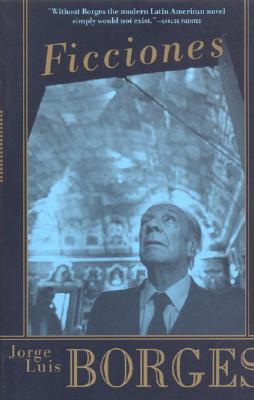 First published in 1945, his Ficciones compressed several centuries' worth of philosophy and poetry into 17 tiny, unclassifiable pieces of prose. He offered up diabolical tigers, imaginary encyclopedias, ontological detective stories, and scholarly commentaries on nonexistent books, and in the process exploded all previous notions of genre. For good or for ill, the blind Argentinian paved the way for a generation's worth of postmodern monkey business - and fiction will never be simply "fiction" again. ~ Mary Park
First published in 1945, his Ficciones compressed several centuries' worth of philosophy and poetry into 17 tiny, unclassifiable pieces of prose. He offered up diabolical tigers, imaginary encyclopedias, ontological detective stories, and scholarly commentaries on nonexistent books, and in the process exploded all previous notions of genre. For good or for ill, the blind Argentinian paved the way for a generation's worth of postmodern monkey business - and fiction will never be simply "fiction" again. ~ Mary ParkAs I was reading Ficciones I was often stumped because I had trouble reconciling the title of the collection with what I was reading. Oh, I did understand that the pieces were fiction, but they read like philosophical treatises so often that by the time I was halfway through a piece I'd forget how it started or what it was supposed to be about. You understand why it took me longer than usual to finish this book, even by story collection standards.
Fortunately there were a handful of stories that kept me going: The Circular Ruins, The Garden of Forking Paths, The Shape of the Sword, Death and the Compass, and The Secret Miracle had just enough philosophy to elevate them to literary status and just enough genre to make them engaging and easy to follow. These six stories had mystery and intrigue to make the very serious questions or morality, fate and wonder seem more down to earth, and I enjoyed them immensely. Yes, my tastes trend toward the bourgeois when it comes to books, and I'm not ashamed to admit it! Seems G.K. Chesterton thought similarly at least part of the time (see banner quote).
Borges' work is definitely inspiring in that it prompts the reader to think about the various "what if"s of the universe, such as what if we're just a figment of a greater being's imagination, what if there is more than one future, what if our potential is so much greater than we know, what if our understanding of history is fundamentally flawed. And he did have a wonderful way with words. The vividness of his writing reminded me of Ray Bradbury, except that Borges' feels more effortless and graceful. I'm guessing the rest of his books aren't particularly light reading either, but given a choice I'll take Borges' collected works any day.
No comments:
Post a Comment